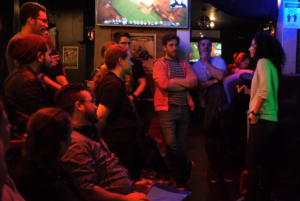It started with a Facebook reminder: A career soiree was going on that night, giving me only a couple of hours to get ready. “It’s not like I’m doing anything else,” I thought.
Five minutes before the event, I’m wandering down St. Denis trying to find the venue, counting down the addresses. I’d expected it to be held in some office or conference room somewhere, but no: it was in an arcade bar—the Meltdown Esports Bar to be exact.

It was already crowded; the event hardly looked like an event, and I began to wonder just what the hell I’d signed up for. I stumbled to the bar, ordered a shot of bright red something, and that’s when it happened—
“Do you know when this is supposed to start?” He asked.
“No idea.”
He paused and nodded, and I slowly came to the realization that a stranger was speaking to me at a networking event; good.
“I’m Matt, by the way.”
“I’m Jon!”
We shook hands and began to talk. We bonded over our absolute confusion what was going on, and we talked a bit about our experience in the industry. Matt had been a QA tester for the last couple of years and was looking to get into systems design; though he had a bit more experience than I did, the two of us were still a couple of seekers, trying to find out how we can get to do what we love.
I’d looked up the speakers on my way: Stacey Shulak and Jillian Mood. Stacey Shulak is a talent management consultant, tasked with recruiting for studios across Montreal. She has tons of experience in the AAA sector of gaming. Meanwhile, Jillian Mood comes from the opposite end of the spectrum. A titan of the indie sector, Jillian is CEO of the Mood Foundation, which organizes game jams, meet-ups, sponsorships, and recruiting events for indie studios in Canada.
The two came from opposite ends of the gaming industry, and this was evident in their presentation:
Jillian stressed the importance of active participation in gaming development: game jams and passion projects are what she asks about in interviews. She wants to see applicants who live and breathe game development, regardless of education or background.
Stacey, meanwhile, highlighted the importance of education and professionalism: having a quality education, an updated LinkedIn, and a presentable portfolio are what will give you a leg up in the industry.
Despite their dichotomous presentation, Stacey and Jillian—and the meet-up as a whole—were a wellspring of knowledge. Here are four things I learned that stand out above the rest:
-
Listen.
More likely than not, someone is going to talk to you. You will also have every opportunity to start a conversation with someone. Do it. And once you do, listen. What are the other person’s passions? Career? Hobbies? What do you share in common? What about them fascinates you?
That’ll help the conversation go beyond small-talk, which is hardly going to leave a lasting, positive impression. And it’ll make you more likable—plain and simple. People love to feel listened to in a conversation, and they love to talk about themselves even more. And at the end of the day, game devs are genuinely fascinating people. They make games for a living; how is that not interesting?
And if you’ve no idea what to talk about, remember: you’ve got a love of games in common. There’s a wellspring of conversation.
-
Have a Business Card
About half of the attendees were students, but I was the only kid from Champlain. I talked to a ton of them, and almost all of them attend various universities around Montreal. Among the students at the event, I was one of the few with a business card. I won’t lie: they were impressed. Maybe even envious.
Don’t forget to bring business cards. You’ll only look that much more professional (without coming off as a try-hard), and it gives you a valuable chance to establish a lasting connection.
-
Go With the Flow
Don’t go in with a game plan. I had no idea what the event was. The only reason I even attended was that I had nothing else to do that evening.
During the Q&A, I had asked a question about game writing (no surprise there), and suddenly I became known as the “writing guy” in the room. After the presentation, I had people asking me about narrative design and wanting to exchange writing tips. Now, I had wanted to ask Jillian a question. However, I got so caught up with talking to others that I missed my chance.
But could I really be upset? I’d made connections with tons of other people in the room, and I could always ask Jillian questions over LinkedIn—which I did!
Networking is all about socializing; you aren’t going in with the explicit intent of getting a job, and if you are—don’t act like it. Social situations are unpredictable, but you’re bound to have a great time if you just go with the flow.
-
Follow-Up
The event’s over; you walk home, fall into bed, and finally get a good night’s rest. But you’re not done quite yet.
Hopefully, you’ve gotten the name’s of the people you met–if you got their business cards, that’s even better! Add them on LinkedIn and write them a quick-you for the talk, or maybe ask a question you’d forgotten the night before. Make some friendly reference to your individual interaction from before, that way you’re not just another face to them.
And again, go with the flow: You shouldn’t just be doing this to get a job; you’re potentially making friends! Don’t be afraid to offer to hang out with someone you’ve befriended, and definitely don’t pass up the chance if they offer! You don’t want to be a stranger in this industry.
So go out and get your name out there!